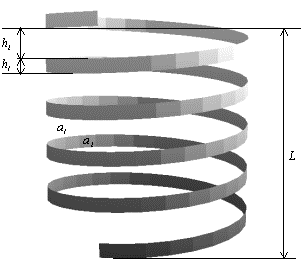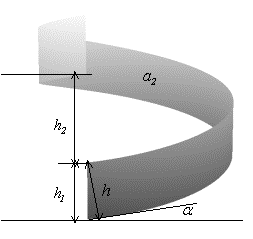V. A. Lebedev
Kutateladze Institute of Thermophysics SB RAS Novosibirsk, Russia
V.P.Soloviev
Birgham
Young University Provo, UT, USA
SUPPORTING DATA OF VIEW FACTORS FOR CYLINDRICAL SPIRALING TAPES
An
expanding scope of engineering problems related to the radiation heat transfer
poses the problems of determining the fraction of ray energy emitted from the
radiating surface i and reaching the
irradiated surface j. This implies
the need for improving the methods of obtaining the geometric invariants of radiation
- the radiation configuration factors (RCFs) ![]() and the mutual surfaces of the
radiating surface including the corresponding RCFs.
and the mutual surfaces of the
radiating surface including the corresponding RCFs.
![]()
At present
one can cite only two reference works1,7 and the monograph9,
which give information about the RCFs for various radiating systems at the
level acceptable from the viewpoint of engineering practice. Before the
handbooks1,7 were published the data on the RCF analytic and
numerical forms for specific configurations of emitting systems were presented
in a broader manner than in other works, and still insufficiently completely,
in the monograph8. In the above works as well as in the periodical
scientific and technical literature there is, however, no information about the
diversity of kinds of radiating systems for which there had been the computed
results for RCFs in the analytic or graphical forms. For example, the spiral
and helical radiating systems belong to almost unexplored objects. The latter
systems are dealt with in the only work10, where the Moebius band
RCFs were computed.
The work6],which is a further development of work5,
the problem is posed on the analytic estimation, in the first approximation, of
the RCFs for the spiral radiating systems with a filament of arbitrary cross
section.
We now proceed to the consideration of a planar cylindrical spiral
formed by an infinitely long band of constant width, which is “rolled up” on an
imaginary cylinder of radius R. In
paper6 various view factors of the spiral are discussed. The case of
a long spiral when L >> R
is the most intriguing for practice. By virtue of the closure and
symmetry of the system the self-irradiated surface ![]() of the cylindrical flat spiral
takes a part (fraction) of the lateral inner surface
of the cylindrical flat spiral
takes a part (fraction) of the lateral inner surface ![]() of the cylinder used for the
construction of the emitting and self-irradiated system in the following
proportion:
of the cylinder used for the
construction of the emitting and self-irradiated system in the following
proportion: ![]() /A
/A![]() =
= ![]() /H. Here H is the flank pitch of the spiral,
/H. Here H is the flank pitch of the spiral, ![]() is the width of the emitting
band of the spiral measured in the direction parallel with the symmetry axis of
the system:
is the width of the emitting
band of the spiral measured in the direction parallel with the symmetry axis of
the system: ![]() = h/cosα (h is the emitting
strip width (the spiral band width measured along a normal to the band edges),
α is the inclination angle of the spiral turn). It follows from here that
= h/cosα (h is the emitting
strip width (the spiral band width measured along a normal to the band edges),
α is the inclination angle of the spiral turn). It follows from here that ![]() /
/![]() =
= ![]() /
/![]() =
= ![]() /H, and the RCF for the
self-irradiation of spiral is
/H, and the RCF for the
self-irradiation of spiral is
![]() = h[1 – 2A
= h[1 – 2A![]()
![]() (1 –
(1 – ![]() )]/(Hcosα)
)]/(Hcosα)
Here are some from the former fastors and auxiliary formulas proposed by
V.P.Soloviev (University Provo, UT, USA) and facilitate the necessary
calculations.

![]()
View Factors of
Cylindrical Spiral Surfaces
1) Right Circular Cylinder
![]()
![]()
![]()
![]()
View Factor (disk A2 to parallel coaxial disk A3 of the same radius R) 2:
![]() , where
, where ![]()
![]() .
.
2) Tape of thickness h is rolled around a cylinder:
![]() is the area of the
lateral surface of the cylinder not covered by the tape;
is the area of the
lateral surface of the cylinder not covered by the tape;
![]() is the area of the
interior surface of the tape,
is the area of the
interior surface of the tape, ![]() .
.
The interior surface of the tape ![]() is defined
parametrically by
is defined
parametrically by
![]()
![]()
![]()
![]() ,
, ![]() ,
,
![]() where
where ![]()



3) View Factors of the finite spiral ![]() :
:
![]()


![]()
![]()
![]()


![]()
![]()
![]()
![]()

![]()
![]()






4) The case of the
infinitely long spiral ![]()


References
1. Howell, J.R., A
Catalog of Radiation Configuration Factors, McGraw - Hill Book Co., New York,
San Francisco, Toronto, 1985.
2. Howell, J.R., Siegel, R.,
Mengüç, M.P.: Thermal Radiation Heat Transfer, 5th
Edition, CRC Press. 2011. Appendix C-10.
3. Lebedev, V.A, Invariance
of radiation shape factor for certain radiating systems, Izv. SO AN SSSR, Ser.
Techn. Nauk, n. 13, iss. 3, pp. 73 - 77, 1979.
4. Lebedev, V.A, About relationships
between radiation configuration factors for cylindrical emitting systems, Soviet Journal of Applied Physics, Vol. 11,
n. 3, pp. 12 - 16, 1988.
5. Lebedev, V.A.: Radiation Configuration Factors
for a Flat Cylindrical Spiral,
Thermophysics and
Aeromechanics, vol.7, No.3, pp.447-450, 2000.
6. Lebedev, V.A.: Geometric Invariants of
Radiation of Spiral Heaters,
Thermophysics and
Aeromechanics, vol.10, No.1, pp.101-108, 2003.
7. Rubtsov N.A. and Lebedev, V.A, Geometric
Invariants of Emission, Inst. of Thermophys, SB RAS, Novosibirsk, 1989.
8. Siegel R. and Howell, J.R.Thermal Radiation
Heat Transfer, McGraw - Hill Book Co., New York, San Francisco, Toronto, 1972
9. Siegel R. and Howell, J.R., Thermal Radiation Heat Transfer,
McGraw ¾ Hill Book Co., New
York, San Francisco, Toronto, 1972
10. Stasenko. A.L., The self-radiation of Moebius band with a fixed shape, Izv. AN
SSSR, Ser. “Energetika i Transport”, n. 4, pp.104 - 107, 1967.